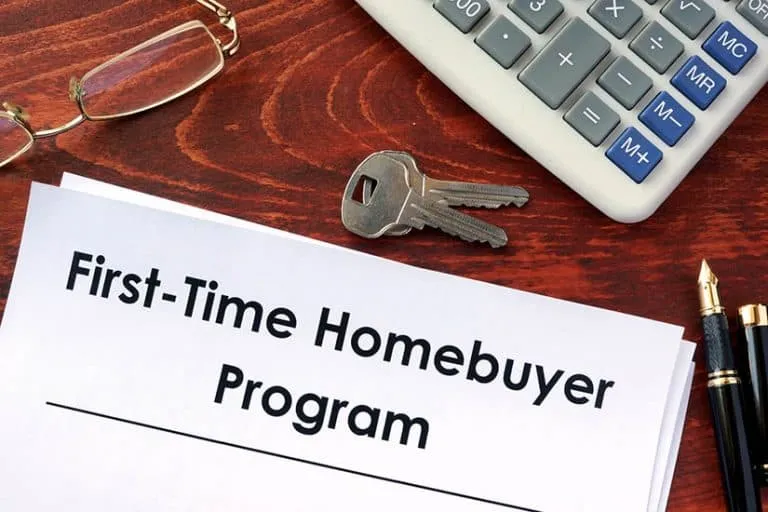Options include loans with low (or zero) down payments and financing for fixer-uppers. There’s not just one choice for a “first-time home buyer loan.” More likely, you’ll compare a few mortgage types. Each one has different requirements, such as how much down payment you’ll need. Then, you’ll choose which one is the right fit for your financial situation.
FHA loans
Loans backed by the Federal Housing Administration require just 3.5% down, making them a popular choice among first-time home buyers. (If your credit score is under 580, you would be required to put 10% down.) In general, FHA loans offer more flexible qualifications than conventional loans.
While you can technically qualify for an fha loan with a credit score in the 500s, approved borrowers tend to have much higher scores. In February 2024, the average FICO score for FHA borrowers buying a home was 687, according to ICE Mortgage Technology.
FHA loans also require FHA mortagage insurance. This protects the lender’s stake in the loan if you default. Borrowers can pay an upfront premium as part of their closing costs and an ongoing premium as part of each monthly mortgage payment.
VA loans
The Department of Veterans Affairs helps eligible service members, veterans and surviving spouses buy homes.VA loans are especially generous, often requiring no down payment or mortgage insurance. (Borrowers do have to pay a one-time funding fee.) They also allow borrowers to have higher debt to income ratios and qualify for larger mortgages — than some other loan programs.
While the VA itself doesn’t set credit or income requirements, individual VA lenders will have their own criteria. According to data from ICE Mortgage Technology, the average FICO score of VA borrowers was 721 in February 2024.
USDA loans
The U.S. Department of Agriculture offers loans directly to homebuyers and backs (or “guarantees”) loans through private mortgage lenders. And, no, you don’t have to live on a farm to get a USD loan. The program targets rural and some suburban areas and allows 100% financing, or zero down payment.
Conventional loans (Fannie Mae and Freddie Mac)
Fannie Mae and Freddie Mac are the engines behind the home loan machine, working with mortgage lenders to offer a range of conventional loan products, some requiring low down payments.
Fannie Mae’s HomeReady loan, for example, is designed for low-income borrowers with credit scores of 620 or higher and requires only 3% down. One advantage of this kind of loan is that borrowers could qualify to end their mortgage insurance once they’ve built up 20% equity in their home unlike with FHA loans, where borrowers can cancel their mortgage insurance after 11 years only if they originally put 10% down.
Freddie Mac’s Home Possible loan is another product geared toward low-income borrowers with a minimum down payment of just 3%. Borrowers can apply sweat equity or funds from gifts, grants or loans toward the down payment.
Home renovation loan options
If you’re planning to tackle some renovations, here are a few mortgage options that can help with the cost.
- EEM, helps borrowers finance energy-efficient homes or energy-saving upgrades. The benefit is that you can enjoy lower energy bills and a more comfortable home sooner instead of picking away at energy-saving projects over time.
- FHA loans are designed for buyers who want to tackle a fixer-upper. This special FHA-backed loan considers what the value of the property will be after improvements and allows you to borrow the funds to complete the project as part of your main mortgage.
- choicer renovaion is a conventional loan program through Freddie Mac that allows you to finance the purchase of a home and the cost of improvements, too, with low down payments.
- Home style from Fannie Mae is another conventional loan option for purchase-and-remodel projects. A 3% down payment is available to first-time home buyers who qualify for the HomeReady program.
- VA renovation loans are available to qualified military borrowers, but lenders that offer them can be harder to find.
We’ve listed six resources available to you as a first-time home buyer. Now, you can reflect on your own needs as a borrower when considering your options. Some loans and programs are a better fit for home buyers with low credit scores, for example, while others are tailored specifically for buyers in your area.
If you qualify for one of these programs or products, they can help you get a home without draining your savings for a down payment, can assist you in navigating additional costs like mortgage insurance and can keep your payments low.
It’s also important to have a real estate agent who understands your specific needs. Choose an agent who has experience with the loan product you’ve picked; they can craft your offer and show the seller you’re a well-qualified buyer.
FAQ Questions and answers
An FHA loan is a mortgage backed by the Federal Housing Administration that requires a minimum down payment of 3.5%. Qualification criteria include credit score thresholds and other factors. Learn more about the FHA loan and its requirements.
While FHA loans technically accept credit scores in the 500s, approved borrowers often have higher scores. In February 2024, the average FICO score for FHA borrowers was 687, according to ICE Mortgage Technology.
FHA loans require mortgage insurance to protect lenders in case of default. Borrowers pay an upfront premium at closing and an ongoing premium with each monthly mortgage payment. Learn more about FHA mortgage insurance.
While the VA itself does not set credit requirements, individual VA lenders typically have their own criteria. According to data from ICE Mortgage Technology, the average FICO score of VA borrowers was 721 in February 2024.
USDA loans, offered by the U.S. Department of Agriculture, provide financing to homebuyers in rural and some suburban areas. They allow for 100% financing (zero down payment) and have specific eligibility requirements related to location and income.
